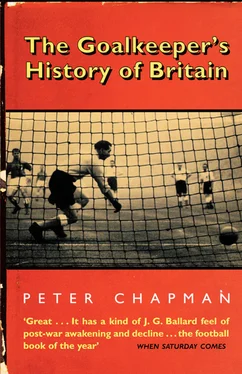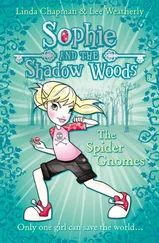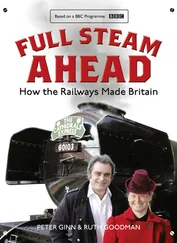Just under a year later the venue and the score were the same, only this time the French were the opposition. It was more perplexing. France had regularly played against England since 1923 but usually in Paris when the English selectors felt like a jaunt across the Channel. Taken with the game against Yugoslavia, it suggested a pattern was developing. Foreign teams need no longer be fodder for the cannons of the England forward line. The two drawn games also meant England were only one slip or stroke of ill-luck away from losing their home record. Control of events was ominously slipping out of our hands.
This was clear in the war in Korea, where the Americans and Russians were dictating events. In addition to 40,000 British troops, the Labour government under Clement Attleee sent along twenty-five warships, but they were under American command. Thanks to my dad’s extra year facing the partizans, he was spared the call-up. His younger brother, Bim, was bound for Korea, till at the last moment India was persuaded to join in by sending some medics. My uncle’s ambulance division went to sweat it out in Hong Kong. The Chinese were a range of hills or so away from his base at Sek-kong and assumed to be ready, on an order from Moscow, to sweep down in their millions. Many soldiers had to be treated for depression and some committed suicide. All you could do was wait. The tension, he said, was awful.
I came downstairs and heard a report on the wireless one morning that British troops in Korea had been attacked on somewhere called the Imjin river. This sounded like my dad’s name, Jim, and a funny thing to call a river. They’d fought off the attack, which was to be expected. But what was alarming was that the assault had been carried out, the broadcaster said, by ‘communist gorillas’. My parents were at work, so I asked my grandparents what this meant and picked up the impression that communists got up to all sorts of tricks. Thereafter, gorillas kept cropping up everywhere.
In Malaya they killed someone called the British High Commissioner. In Kenya, they’d been stealing from white people’s houses in Nairobi. Here they’d formed an armed band with the frightening sounding name of ‘Mau Mau’. It was said they got together in the jungle in secret to ‘swear oaths’. This wouldn’t have done round our way. With the exception of people much further down the street, you didn’t go around swearing oaths. Why were they like this? It was said they wanted the white man out of Africa, yet it was we who did things honestly and openly, wasn’t it? The British police and army, for example, were doing their straightforward best to deal with them. The gorillas, on the other hand, in Asia, Africa or wherever, did things in an unreasonable and underhand way. Reports of their activities suggested that now everything was against us, even the animal kingdom.
Soon after the France match, Bert Williams suffered a shoulder injury which threatened to end his career. Given the gravity of the global situation, there could have been few worse times for it.
For a small village, Great Marfold had a good team and could call on players from a much wider area. The uncle married to my dad’s oldest sister, Laura, played centre-forward. She went to watch when they’d advanced to the late stages of one of the Bedfordshire cups. It was a Saturday afternoon game, quite sunny, at the Victoria Works ground in Bedford. Their keeper, Bill Farrell, was twenty-one and due for a trial at Luton Town the following Monday.
In the style of the day, their opponents had a hard centre-forward, a curly-haired fellow called Red Venner. ‘Dirtiest man ever walked on a football field,’ said my aunt. ‘I heard him shout out during the game, “Get that big bugger!”, pointing at Bill.’ When a cross came over, Farrell took it arms outstretched, body taut. Venner came in, studs raised, and caught him hard in the chest and stomach. ‘Well, you said you’d get him,’ my aunt shouted at him, as they carried the keeper off. My uncle took over in goal.
In the dressing room they gave Farrell a cup of hot sweet tea. When they took him to hospital and he was waiting to be seen, he kept doubling over to ease the pain. The proper sister wasn’t on that evening. Something had perforated in his stomach and he died next afternoon. ‘The day his banns were called,’ said my aunt. ‘And he’d have got in the Luton team easily.’ Venner’s son was apprenticed to my uncle as a toolmaker. He said his father had hung up his boots, would never play again, and didn’t sleep for a month after the incident.
Bert Williams had been injured before. It may have had something to do with the way he played, taut and, like a compressed spring, waiting to bounce. But there were always good stand-ins available. We had the greatest goalkeepers in the world and any one of them could be drafted in to do a perfectly adequate job by our standards. By anyone else’s, it would be superb.
Bernard Streten, Luton’s veteran keeper and favourite of my Bedfordshire uncles, had deputised for Williams once in 1949. He came in, did all that was required in a match in which he had very little to do, and never played for England again. His only international cap was a reward for long-standing service to the cause, bestowed by the selectors in the spirit of ‘they also serve who stand and wait’.
The same sentiment guided them as they brought in Gil Merrick of Birmingham City now late in 1951. Williams wasn’t expected to be gone long. Though two years younger, Merrick was already thirty. He’d been overlooked as a contender in the Swift succession. At that time Birmingham had been promoted from the Second Division to the First, thanks to his conceding only twenty goals in forty matches. But next season his team’s form was so bad that two of their players started arguing on the field on a visit to Highbury, and almost came to blows. Team captain Merrick ran upfield and told them to ‘turn it in’. A selector was in the stands and concluded that a keeper had no business out there getting involved. An army man in the war, Merrick soldiered on as his team was dispatched back to the lower division. Eventually he was deemed worthy of reward and proved a decent stop-gap for Williams.
For the spring-to-autumn months up to Merrick’s selection, Clement Attlee’s Labour government had tried to lift the nation’s spirits with a celebration of its new British way. The Festival of Britain was held down by the Thames on bombed wasteground by Waterloo Bridge. There was a steam train, and big iron wheels standing there for people to look at. My parents said there would be a firework display and some kind of dome. They took me along and told me it was good. The festival made no impression on me, other than the strangeness of its slogan: ‘Tonic for the Nation’.
A tonic was something my grandparents had when they were ill. They’d get it from Dr Dadachanji’s surgery at the end of Colebrooke Row, opposite the gardens, the last house before Goswell Road. His waiting room in the front parlour was cold and dim, with a few wooden chairs, and his surgery was at the back. Dr Dadachanji was small and quiet and, to me, mysterious. He probably was to everybody. I’d gone to see him when my nose bled badly and people didn’t know what to tell me but to put my head back. The blood ran down my throat and came back later in livery globs. Dr Dadachanji sent me to the children’s hospital in Hackney Road, where they plugged my nose with cotton wool soaked in snake venom. Mysteriously, it worked.
Millions were spent on the festival and millions came. It was pronounced a great success. An uplifted people should have gone to the polls in the general election the month after the festival closed and swept Attlee back into power. He was running against Winston Churchill, who had lost in the 1945 election because he was considered yesterday’s man. Many people, however, had picked up the idea that the nation was a bit poorly. A large part of the electorate did certainly vote Labour, even though many of them were in places much too far from London to have gone to the festival. They were in the big industrial constituencies, with enormous Labour majorities, but they only counted for one seat. Many in the lesser populated areas – strangely, a lot of them nearer London, so they may have visited the festival – voted Conservative. Labour got more votes, the Conservatives more constituencies, and Churchill returned to office.
Читать дальше












